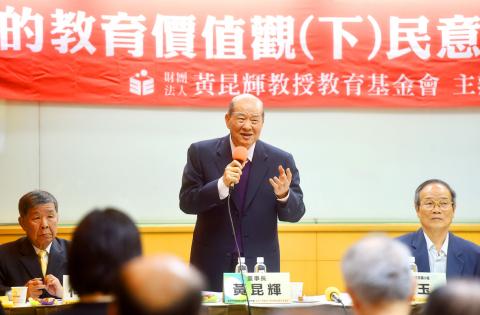A majority of Taiwanese support making English the nation’s second official language and promoting bilingual education, a poll released yesterday by the Professor Huang Kun-huei Education Foundation showed.
Eighty-seven percent of the respondents agreed that English should be Taiwan’s second official language, while 9 percent disagreed, the poll showed.
Eighty-nine percent said that public elementary and junior-high schools should offer bilingual classes taught in Mandarin and English, a practice only allowed at private schools, poll committee member Feng Ching-huang (馮清皇) told a news conference in Taipei.

Photo: Chien Jung-fong, Taipei Times
The National Development Council on Dec. 6 unveiled a blueprint to make Taiwan a bilingual nation by 2030, but whether to list English as the nation’s second official language is still being debated.
National Taiwan Normal University information and computer education professor Ho Rong-guey (何榮桂), who attended the news conference, said that most respondents seemed to support the policy, adding that officials should start working on it soon, for example by preparing bilingual versions of official documents and improving their English proficiency.
Most respondents also said that the nation’s education system needs to be reformed to put more emphasis on thinking, rather than knowledge-oriented instruction that merely helps students obtain diplomas, the poll showed.
Asked whether they agreed with the idea that curricula taught at elementary, junior-high and high schools should encourage students to have a deeper understanding of Taiwanese geography, history and culture, 68.8 percent of respondents said yes, while 26.1 percent said no.
It is curious that the question’s approval rating was less than that of other questions, especially among the group of respondents with higher education, Ho said, adding that the results need to be analyzed further.
Most Taiwanese have progressive educational concepts that echo global trends, so the government should accelerate its educational reforms, foundation chairman Huang Kun-huei (黃昆輝) said.
The telephone survey was conducted from Nov. 27 to Nov. 30 and collected 1,071 valid samples from people older than 20, and has a margin of error of 3 percentage points.

MAKING WAVES: China’s maritime militia could become a nontraditional threat in war, clogging up shipping lanes to prevent US or Japanese intervention, a report said About 1,900 Chinese ships flying flags of convenience and fishing vessels that participated in China’s military exercises around Taiwan last month and in January have been listed for monitoring, Coast Guard Administration (CGA) Deputy Director-General Hsieh Ching-chin (謝慶欽) said yesterday. Following amendments to the Commercial Port Act (商港法) and the Law of Ships (船舶法) last month, the CGA can designate possible berthing areas or deny ports of call for vessels suspected of loitering around areas where undersea cables can be accessed, Oceans Affairs Council Minister Kuan Bi-ling (管碧玲) said. The list of suspected ships, originally 300, had risen to about 1,900 as

Japan’s strategic alliance with the US would collapse if Tokyo were to turn away from a conflict in Taiwan, Japanese Prime Minister Sanae Takaichi said yesterday, but distanced herself from previous comments that suggested a possible military response in such an event. Takaichi expressed her latest views on a nationally broadcast TV program late on Monday, where an opposition party leader criticized her for igniting tensions with China with the earlier remarks. Ties between Japan and China have sunk to the worst level in years after Takaichi said in November that a hypothetical Chinese attack on Taiwan could bring about a Japanese

Right-wing political scientist Laura Fernandez on Sunday won Costa Rica’s presidential election by a landslide, after promising to crack down on rising violence linked to the cocaine trade. Fernandez’s nearest rival, economist Alvaro Ramos, conceded defeat as results showed the ruling party far exceeding the threshold of 40 percent needed to avoid a runoff. With 94 percent of polling stations counted, the political heir of outgoing Costa Rican President Rodrigo Chaves had captured 48.3 percent of the vote compared with Ramos’ 33.4 percent, the Supreme Electoral Tribunal said. As soon as the first results were announced, members of Fernandez’s Sovereign People’s Party

MORE RESPONSIBILITY: Draftees would be expected to fight alongside professional soldiers, likely requiring the transformation of some training brigades into combat units The armed forces are to start incorporating new conscripts into combined arms brigades this year to enhance combat readiness, the Executive Yuan’s latest policy report said. The new policy would affect Taiwanese men entering the military for their compulsory service, which was extended to one year under reforms by then-president Tsai Ing-wen (蔡英文) in 2022. The conscripts would be trained to operate machine guns, uncrewed aerial vehicles, anti-tank guided missile launchers and Stinger air defense systems, the report said, adding that the basic training would be lengthened to eight weeks. After basic training, conscripts would be sorted into infantry battalions that would take